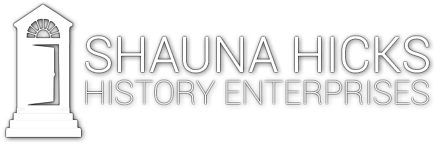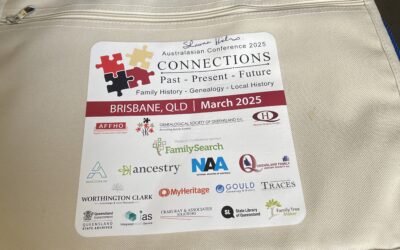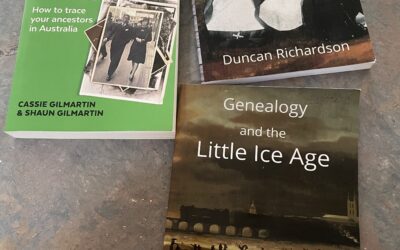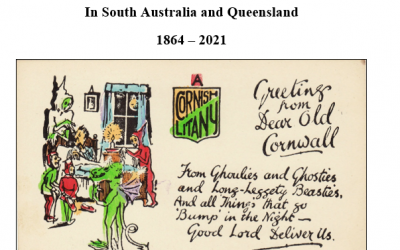The title of this blog is actually the title of a publication by Ralph Reid in association with Gould Genealogy and published in 2006. Despite the broad ranging title, it only looks at three genealogy resources which formed a sub-title to Reid’s original publication. These three sources are:
- Pioneer registers
- Biographical dictionaries
- Bibliographies
Given our tendency these days to Google everything, check library catalogues online, look at Wikipedia, it is not often that I find myself sitting down and searching a paper publication. It even takes me a little while to remember how a keyword index works on paper. But I find myself sitting here turning the pages and seeing things that I would not think to search for online. How much are we missing out on if we don’t still use resources that are not online?
When was the last time you looked for a published pioneer register for the area in which your ancestors lived? When did you last use a biographical dictionary and I don’t mean the Australian Dictionary of Biography Online. What about a bibliography?
I have been helping my mother’s neighbour research her family in Armidale, NSW but I haven’t advised her to look at the Pioneer Register of New England from First Settlement to Federation by the Armidale Family History Group in 2003. The neighbour has very early Armidale roots and chances are her family is in this publication but how does she know to look for it in the first place. This is where collective publications like Reid’s are so useful, because they group similar publications together and make them easier to find.
Seeing it in Reid’s book, I put “Armidale Pioneer Register” into Google and it turned up references to it including a wonderful selection of photographs from the Register. There is a link back to an order form to buy the publication which has over 1200 entries.
Using this methodology I tried “Shoalhaven Pioneer Register” in Google and it brings up a number of returns for the catalogue entry in the National Library of Australia and other libraries as well as references to the Shoalhaven Family History Society and their publications for sale. Going through the Society’s list of publications, I find that they have published a Shoalhaven Pre 1900 Pioneer Register and it is still in print.
Coming back to Reid’s publication, I can quickly scan the keyword index of places and see if any are places of interest to me whereas with Google, I have to stop and think what places I am interested in and then search them individually.
Another option is to simply enter ‘pioneer register’ as a term. In this instance I received 14,300 hits which I could then scroll through or try and narrow down by adding a state or place.
The second section on biographical dictionaries was even more interesting as these are not usually bound by a geographic place and can cover a whole range of specialities. For example, skimming the pages I can see cricketers, Aboriginal artists, scientists, writers, Jesuits, convicts, Civil War veterans in Australia, politicians, Western Australians and so on. The diversity is simply amazing. Again the keyword index groups like publications together. A search on Google for ‘biographical dictionaries” only brought up 1,370 entries and again this could be narrowed down.
Or perhaps the search term should be “biographical dictionary” and of course, this time the results were 33,700 hits. The first one is the excellent Australian Dictionary of Biography Online Edition. One could spend hours trawling through the various entries here.
The final section of Reid’s publication is Bibliographies which used to be a popular form of publication in pre-computer days as it used to bring together a range of publications on a topic. Now we can, more or less, do the same ourselves with our local library catalogue if it is online or the State Library catalogue or even the National Library of Australia (NLA) catalogue. Their new online catalogue TROVE does it all instantly for you, even searching newspapers, manuscripts and photographs.
Is this spoiling us too much? Are we losing the ability to look for our own resources and if we couldn’t find it online would we look for it elsewhere? Don’t get me wrong, I love TROVE but not everything is in the NLA (perhaps it should be) and not everything is findable by Google. Not all local and family history societies are on the Web but they still create finding aids and publish.
See also my blog on 13 February 2010 Why You Should Still Use Bibliographies which looks specifically at Ralph Reid’s state based series of family history bibliographies.
This post is simply a reminder to seek out research compilations, usually published by individuals, genealogy/family history or local history societies that provide biographical entries on our ancestors. They may only be print published, only online or a combination of both. But if you haven’t looked for a biographical dictionary, bibliography or a pioneer register before, now is the time to start. Let me know how you go – success stories are always good to read.





Hi Shauna, My wife, Aileen and I have enjoyed your several helpful addresses aboard both voyages of the ‘Voyager of the Seas’ and now learn that you will be helping us all in Norfolk Island.
When I was 5 1/2 years old, my Murphy grandmother had two, then unmarried daughters take turns with her on a Sunday to read excerpts to me from the 1838 T. Crofton Croker published twin volumes edition of my Gt.Gt.Gt. Grandfather’s ‘Memoirs of Joseph Holt’. I was not allowed to read the comic section of the newspapers on a Sunday and was puzzled why I had to learn of his exploits!
As a successful County Wicklow United Irish General, having won three battles in East Ireland, Joseph surrendered under the Dublin Directory’s direction to stop the carnage meted out by the Ascendancy and British troops upon the supportive United Irish villagers.
When they disembarked from the Minerva in 1800, Joseph became Captain William Cox’s manage. His Sydney trial, with Judge Atkins presiding, could not prove his involvement in the outer Parramatta area version of Vinegar Hill. However, Governor King, fearful of him leading his former men, now convicts to success, had Joseph sent peremptorily to Norfolk Island where he suffered under Major Foveaux until his medical rescue by surgeons Wentworth and Redfern.
I am now 81 years of age and look forward to learning more and confirming the information on my ancestor which I have garnered in NSW, England, Norfolk Island and the ACT. If you wish to telephone me on (02) 4975-4919 to discuss Joseph Holt, I will return your call at no charge to either of us.
Wow Lionel what an impressive ancestor. Our connection with Norfolk Island is the first settlement, not the second so I don’t know much about it. Between now and October I will be reading up on both settlements. Looking forward to catching up with you again!